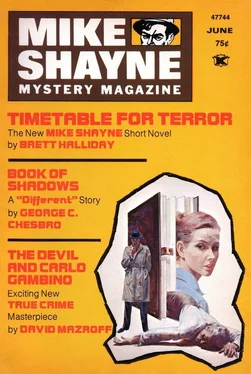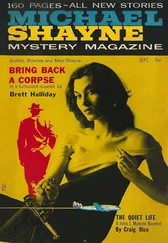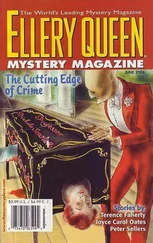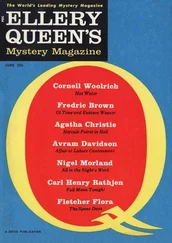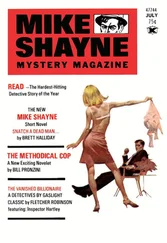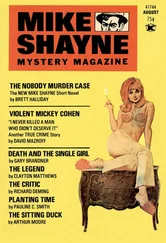Майкл Бретт - Mike Shayne Mystery Magazine, Vol. 36, No. 6, June, 1975
Здесь есть возможность читать онлайн «Майкл Бретт - Mike Shayne Mystery Magazine, Vol. 36, No. 6, June, 1975» весь текст электронной книги совершенно бесплатно (целиком полную версию без сокращений). В некоторых случаях можно слушать аудио, скачать через торрент в формате fb2 и присутствует краткое содержание. Город: Los Angeles, Год выпуска: 1975, Издательство: Renown Publications, Жанр: Детектив, на английском языке. Описание произведения, (предисловие) а так же отзывы посетителей доступны на портале библиотеки ЛибКат.
- Название:Mike Shayne Mystery Magazine, Vol. 36, No. 6, June, 1975
- Автор:
- Издательство:Renown Publications
- Жанр:
- Год:1975
- Город:Los Angeles
- ISBN:нет данных
- Рейтинг книги:4 / 5. Голосов: 1
-
Избранное:Добавить в избранное
- Отзывы:
-
Ваша оценка:
- 80
- 1
- 2
- 3
- 4
- 5
Mike Shayne Mystery Magazine, Vol. 36, No. 6, June, 1975: краткое содержание, описание и аннотация
Предлагаем к чтению аннотацию, описание, краткое содержание или предисловие (зависит от того, что написал сам автор книги «Mike Shayne Mystery Magazine, Vol. 36, No. 6, June, 1975»). Если вы не нашли необходимую информацию о книге — напишите в комментариях, мы постараемся отыскать её.
Mike Shayne Mystery Magazine, Vol. 36, No. 6, June, 1975 — читать онлайн бесплатно полную книгу (весь текст) целиком
Ниже представлен текст книги, разбитый по страницам. Система сохранения места последней прочитанной страницы, позволяет с удобством читать онлайн бесплатно книгу «Mike Shayne Mystery Magazine, Vol. 36, No. 6, June, 1975», без необходимости каждый раз заново искать на чём Вы остановились. Поставьте закладку, и сможете в любой момент перейти на страницу, на которой закончили чтение.
Интервал:
Закладка:
The Gallos.
The Gallos wanted in. They were no longer satisfied with being mere hit men. Larry Gallo, the oldest of the three brothers, was invited to a meeting at the Sahara Lounge in Brooklyn to discuss the demands made on Gambino. He was told he would receive good news. He barely escaped death in the form of a noose around his neck, by the appearance of a cop on a routine check of his rounds.
Crazy Joe Gallo was arrested by three detectives on a charge of extortion and convicted in a sensational trial. He was sentenced to a term of seven to fourteen years. When Crazy Joe was released from prison he attempted to take over again. The year was 1971. He had only a short time to live. He married a lovely young woman and was celebrating with his bride and several friends and their wives in the early morning hours at Umberto’s Clam House in Brooklyn when two gunmen walked in and shot him dead.
Vito Genovese died suddenly in prison. Joe Adonis died in Italy. Tommy (Ryan) Eboli, a top lieutenant in the Genovese family, was shot and killed. Jerry Catena went to prison.
And now, at last, Carlo Gambino was on top with no one to challenge him.
Federal authorities have tried to deport him but each time they sought to bring him into court Gambino was suddenly seized with a heart attack. He is today in his seventies, his once sturdy figure down to 145 pounds, his face thin, the nose elongated, but the brain is as agile as ever, and he remains the Godfather to the Syndicate.
Though he remains powerful, his word law, he is not a vicious man.
It has been peaceful for a while. What will happen after Gambino dies no one really knows. It’s a good bet that murders will once again he committed in a struggle for supremacy and the title of capo di tutti capi.
Uneasy lies the head that wears a crown? Maybe.
A Record of Guilt
by James McKimmey
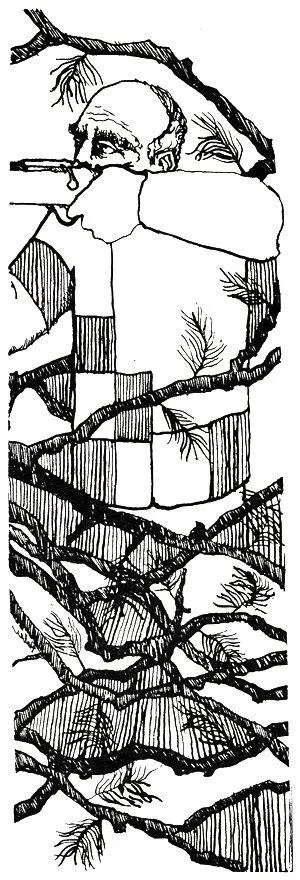
A dog found the body, but it was up to one lone cop to translate what just had to be.
It was the sixth time Inspector Harry Grange had made the commuter-train trip from the city up to the small town in the low mountains. And it was twenty-eight days since the bullet ridden body of Noel Berry had been found buried behind the weekend cabin of John Shrewer.
Grange, tall and rocky with cop-cold eyes, climbed from the train. He walked the length of the main street of the town, then continued along the narrow winding road which led to the various cabins interspersed through the woods beyond.
A half mile out, Grange paused in front of a white-painted house, the size and durable look of it indicating its year-around use. A brown and white beagle, ears flying, back legs splaying out with each bound, speeded toward Grange.
“Hello, Biscuit!” Grange said with enthusiasm. He reached down to ruffle the hair of the dog’s head.
A tall man in boots and suede jacket appeared in the doorway, saying, “Hello, Inspector. Back again I see.”
Grange nodded.
“And I guess Biscuit hasn’t forgotten you,” the man said.
“A good dog, Mr. Martin,” Grange said. “Mind if I take him for a walk?”
George Martin shook his head, smiling. “He’d tear the house up if I didn’t let him. You’re going to look over Shrewer’s property again?”
“Yes,” Grange said.
“You’re a stubborn man, Inspector. But then maybe that’s what makes a good policeman. I mean, take Biscuit there, he’s stubborn, too. That’s why he’s a good rabbit hunter. If he hadn’t been so stubborn that way, why, we’d never have found that fellow’s body, never have known anybody’d been murdered up here. Well, I wish you luck, Inspector. I think John Shrewer did it, all right. I hope you can prove it, in time.”
Grange nodded, then he and the dog moved on. A mile further along the road, Grange stopped. A brown and yellow mountain cabin was perched just off the road along a bank that ran down into a deep ravine. Grange knew that Shrewer was not there. His car was absent, and, although it was a warm day, the front door of the house was closed and windows were covered securely by strongly-built metal shutters. The beagle stood beside Grange, panting happily, then stood up on short hind legs and licked his hand.
Absentmindedly patting the dog’s head Grange thought of the day he’d come here and had first seen the dug-up body of Noel Berry, John Shrewer’s bright young bookkeeper. It had not been a pleasant experience, but Grange had been through enough such sights that he was able to concentrate on the details of his work.
Professional impersonality had left him twice, however. Once he’d felt compassion when he’d been required to talk to Berry’s distraught mother and to the young man’s intended bride. When he had begun his questioning of the obvious suspect, John Shrewer, his usual lack of emotion had been replaced by a distinct distaste, nearly approaching hate.
Shrewer, of course, had been implicated the instant Noel Berry, missing for several days, had been discovered here. The body had been securely buried, until Biscuit’s sensitive nose had come near, at the bottom of the ravine behind Shrewer’s weekend cabin.
Because Shrewer’s permanent residence was in the city, and because of the logical suspicion cast upon him, Grange had been assigned to the case.
Looking down the slant of the ravine, Grange remembered his first impression of Shrewer. He had tried very hard to shake his immediate dislike for the man. Shrewer, however, had only helped intensify the feeling by the way he looked, by the way he acted.
He was, in truth, a bitter, aging bachelor, whose cold gray eyes reflected no warmth or sympathy. There was a rasping, domineering quality to his voice. His temper was short. He was the owner of several small retail businesses, and he was the controlling factor of an expanding real-estate corporation development.
Even though Grange put little faith in first impressions, he was nevertheless certain that Shrewer’s exterior was an exact reflection of the inner man. And Grange had been certain, from the beginning, that Shrewer had killed Noel Berry.
Investigation had proven only that Shrewer was a man whom nobody liked, a man whose business dealings were as deadly as though he used a sword instead of crafty intelligence. His neighbors in the city avoided him. His associates aligned themselves with him solely for business purposes. The people of this small town where Shrewer spent occasional weekends characterized him as a flinty, sharp-tongued, tight-fisted old man who argued over bills honestly charged to him and who tried in every way possible to get the most for nothing.
He could, most townsmen fervently agreed, kill a man as easily as he could cheat at a purchase. But, there was no legitimate indication of Shrewer’s guilt. No proven motive. Not even a small piece of evidence that Shrewer had even been in the area at the time of the killing.
Shrewer had stood angrily on his statement that he had not left his city apartment the Sunday of Berry’s murder; that, in fact, he had not been to the cabin in over two months. There was no proof available that he had remained in that city apartment; but then there was no proof that he had not. No one had seen him drive through town; but he could have arrived and left unnoticed by an alternate route on the other side of the woods.
Nor had a murder weapon been found.
Once again the beagle leaped up to lick at Grange’s hand, and Grange reached into a pocket to draw out a wallet, the one that had been found in Berry’s hip pocket. Grange extended the wallet toward the beagle, letting the dog sniff it. Then he patted the dog’s flank. “All right, boy.”
Читать дальшеИнтервал:
Закладка:
Похожие книги на «Mike Shayne Mystery Magazine, Vol. 36, No. 6, June, 1975»
Представляем Вашему вниманию похожие книги на «Mike Shayne Mystery Magazine, Vol. 36, No. 6, June, 1975» списком для выбора. Мы отобрали схожую по названию и смыслу литературу в надежде предоставить читателям больше вариантов отыскать новые, интересные, ещё непрочитанные произведения.
Обсуждение, отзывы о книге «Mike Shayne Mystery Magazine, Vol. 36, No. 6, June, 1975» и просто собственные мнения читателей. Оставьте ваши комментарии, напишите, что Вы думаете о произведении, его смысле или главных героях. Укажите что конкретно понравилось, а что нет, и почему Вы так считаете.
